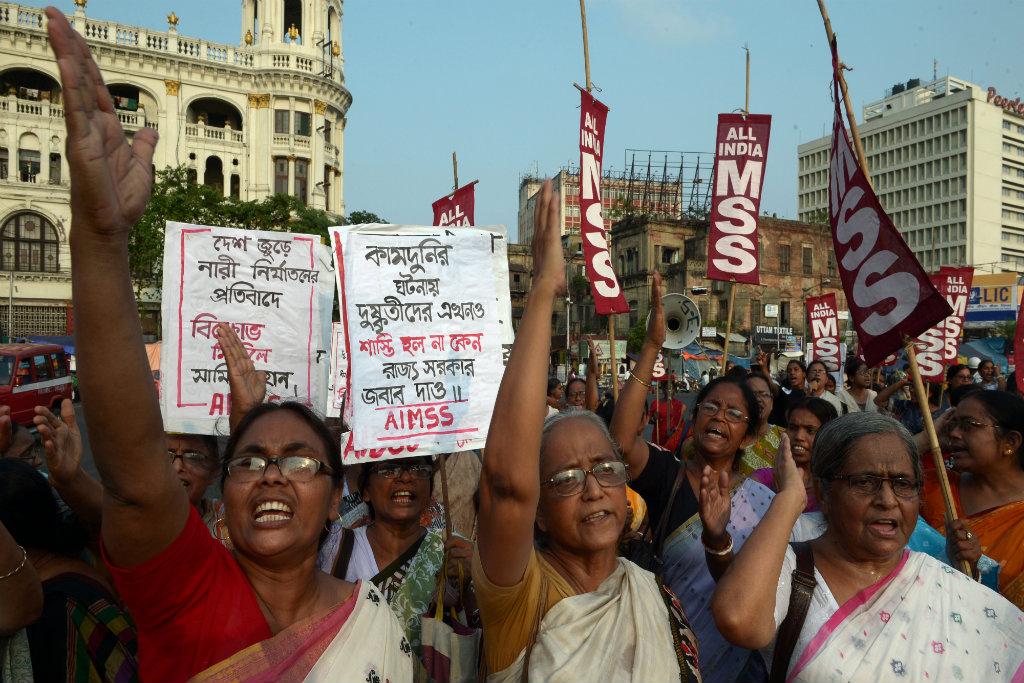In India, village elders sanction ‘retaliatory rape’
Indian activists from the Social Unity Center of India (SUCI) shout slogans against the state government in protest against the gang-rape and murder of two girls in the district of Badaun in the northern state of Uttar Pradesh and recent rapes in the eastern state of West Bengal, in Kolkata on June 7, 2014. The protests came amid a growing uproar over the killings in Uttar Pradesh, with the United Nations saying violence against women should be regarded as a matter of basic human rights. The two cousins, aged 14 and 12, were found hanging from a mango tree in their impoverished village, with subsequent tests showing they had been the victim of multiple sexual assaults.
In another shocking display of sexual violence in India, a 14-year-old girl was dragged through a forest and raped Monday last week as punishment for her brother’s alleged sexual assault of a neighbor’s wife.
The woman’s husband, Nakabandi Pasi, carried out the “retaliatory rape” with the consent of a village elder who was also Nakabandi’s father-in-law. No one dared intervene, villagers told The Indian Express.
The assault – which occurred in a village in Bokaro in the eastern state of Jharkhand that is home to people from India’s lowest caste – was the second time this year that local leaders used rape as punishment. In January, a 20-year-old woman from West Bengal was gang raped on the orders of her village council because she fell in love with a man from another town.
These crimes reflect the strict patriarchal system still dominant in rural India. Women’s bodies are viewed as repositories of their family’s honor, and any risk or damage to that honor – whether it’s falling victim to sexual assault or daring to wear jeans – requires retribution. That could mean an “honor killing,” as in a case last year when a couple planning an elopement were brutally murdered by the man’s family.
Or it could mean rape as punishment.
“Notions of revenge and honor have always been intertwined,” Amana Fontanella-Khan, a feature writer from Mumbai, wrote in a column for The Daily Beast. “These can cause women to end up as collateral, even when they themselves have committed no wrong.”
Women’s rights issues have rocked India since the much-publicized gang rape of a physiotherapy student in a bus in Delhi in 2012. The incident led Parliament to set harsher penalties the following year for crimes against women such as molestation and groping, stalking, voyeurism and acid attacks.
But the new laws have done little to curb the rate of sexual violence. On the contrary, the number of registered rape cases in the country has increased from about 25,000 in 2012 to almost 34,000 in 2013, according to the latest report from India’s National Crime Records Bureau.
These numbers don’t yet include the rape of a Danish tourist in Delhi in January this year, or the heavily protested gang rape and hanging of two young girls in the northern state of Uttar Pradesh in May.
“Even though the laws are there, many people feel they can get away with anything,” Ranjana Kumari, a women’s rights advocate and director of the Center for Social Research in New Delhi, told The Washington Post.
Indian politicians’ casual regard for rape does little to help efforts against sexual violence.
“This is a social crime that depends on men and women,” Balubal Gaur, Home Minister of the central state of Madhya Pradesh, said to reporters in June. “Sometimes it’s right, sometimes it’s wrong.”
Gaur’s comments came two months after Uttar Pradesh Chief Minister Mulayam Singh Yudav opposed capital punishment for rape by saying, “Boys are boys, they make mistakes.”
Deep-seated traditions also continue to overrule modern notions of justice, especially in rural areas. In the Bokaro case, the girl’s mother reportedly pleaded with her neighbors and the council to stop the attack.
“We begged them with folded hands, but they would not listen. They dragged her away to the forest,” she told India's CNN-IBN news channel.
The victim’s parents found their daughter in the woods an hour after the assault. The girl, whom reports have declined to name, was later admitted into the Tenughat Sub-Division Hospital, bleeding and in pain, according to Shiwani Singh, the attending doctor.
The girl was released last Wednesday but was readmitted later that evening because of renewed bleeding, Singh said to The Indian Express.
Local police have since arrested Nakabandi and his father-in-law, Ghosal Pasi, along with the victim’s brother.
“We are taking this case very seriously,” Jitendra Singh, a police official, told the Associated Press on Friday.
